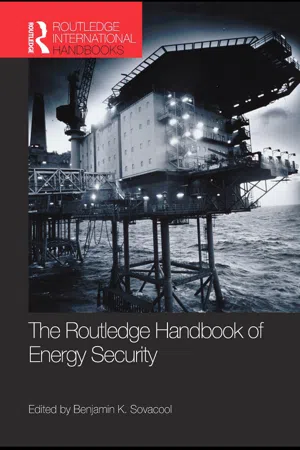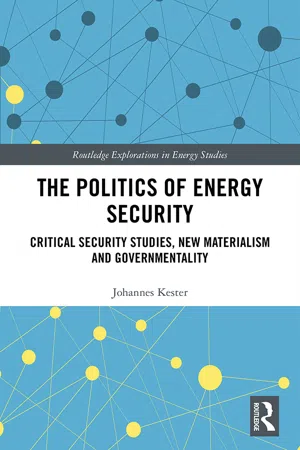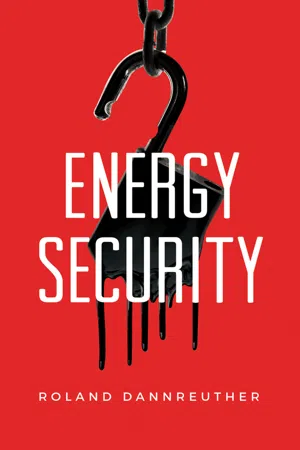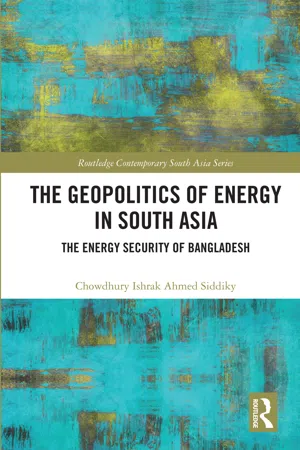Impact of Energy Insecurity
The impact of energy insecurity refers to the negative consequences resulting from a lack of reliable access to energy resources. This can lead to economic instability, social inequality, and environmental degradation. Energy insecurity can also exacerbate geopolitical tensions and hinder sustainable development efforts.
6 Key excerpts on "Impact of Energy Insecurity"
- eBook - ePub
- Benjamin K. Sovacool, Benjamin K. Sovacool(Authors)
- 2010(Publication Date)
- Routledge(Publisher)
...In contrast, energy insecurity can be seen as a lack of, or inconsistent access to, sufficient affordable energy of the type and quality necessary for a healthy life. Such a definition of household energy security includes several aspects. Physical availability includes a geographical dimension. In other words, the supplies should be available in proximity to where the household is located. Economic affordability requires that the energy be supplied to households at prices that even the poorest can pay. Sufficiency or adequacy is harder to define as this may vary tremendously from region to region depending on climate, customs, and living standards. However, ensuring adequate energy for a healthy life implies that the types and amounts of energy should meet household needs for cooking, heating, and lighting at a minimum without adverse health impacts. Security from a household perspective also requires that supplies of energy be regular, reliable, and of standard quality, that is, uninterrupted and unadulterated. For many poor households energy insecurity is a fact of life. The energy needs of the poor are small, but even so supplies are often completely lacking or unreliable, and costs, especially of initial expenditures to assure connections or buy capital equipment needed to use more efficient energy sources, can be significant and constrain adoption. There is a large funding gap in providing energy access for the poor that has not been seriously addressed by existing financial mechanisms and financing institutions. Strong political will and government commitment are also required to prioritize investments in energy critical for development of energy resources for the poorest in the population...
- eBook - ePub
The Politics of Energy Security
Critical Security Studies, New Materialism and Governmentality
- Johannes Kester(Author)
- 2018(Publication Date)
- Routledge(Publisher)
...2 The historic proliferation of energy security 2.1 Introduction The crux behind debates on energy security is that the insecurity of someone living in a European country differs from those living elsewhere in the world, as well as from those within the same country. Different geographical, temporal and environmental circumstances dictate different energy needs, while different market and regulatory structures dictate the options people have to fulfil these needs. Yet, despite these differences, almost everybody is connected through global energy systems and markets of coal, oil, natural gas, uranium, wood pellets, corn, renewable technology, battery storage and so on. Not a single country can run from the climate effects of these markets nor can it be entirely independent from them. Simultaneously, energy is closely connected to the production, trade and consumption of other resources, while those same resources enable the production of energy, be they water (cooling/hydro), food (biofuels) or rare earth minerals (renewable technologies). 1 Furthermore, the current transformation from a traditional fossil fuel system into a renewable electrified energy system is changing the earth’s topography, physical infrastructures, market structures, social habits and power structures. This complexity returns in debates on the concept of energy security. In fact, Hildyard, Lohmann and Sexton rightly remark that there are two things confusing about energy security: the concept of energy and the concept of security. 2 For Hildyard, Lohmann and Sexton, both of these concepts hide many of the underlying sociopolitical and economic choices behind energy consumption and production, as they only implicitly touch upon the actual choice for a particular energy source or the decision who is in need of security. These latter choices are often foregone conclusions in most policy-oriented energy security debates whose prime focus it is to secure the resulting situation in the first place...
- eBook - ePub
- Roland Dannreuther(Author)
- 2017(Publication Date)
- Polity(Publisher)
...These services include most of the advances in prosperity and well-being of our modern industrial civilization – services such as heating, transportation, communications, food, consumer products and housing. In a modern society, the enormous increases to the collective social well-being that these services provide are ultimately underpinned by, and would not be possible without, the modern energy systems on which they depend. If the problem of energy security is defined in this way, in terms of ensuring the minimization of risk to these energy-dependent services, then it is not the rich industrialized world that truly suffers from energy insecurity. In practice, it is rare that prosperous citizens in the North suffer anything more than intermittent interruptions to such services. This is not the case in many parts of the poorer developing world. It is estimated that 1.4 billion people lack access to electricity and 2.4 billion do not enjoy modern cooking services (Bhattacharyya 2013: 228). For these people, the lack of such services, in part due to the lack of access to modern energy systems like the electricity grid, is a very serious source of individual insecurity. This includes the insecurity of having to search for reliable supplies of energy; the health implications of the need to collect and use wood or other biomass sources; and the poverty and lack of opportunity that come from being disconnected from the networks for social advancement. It is here that energy insecurity has a strongly developmental dimension and where energy poverty converges to a significant degree with the concept of energy security (Pachauri 2010). Energy Security and Debates in Security Studies As these various differing dimensions of energy security demonstrate, the concept is fluid and diverse, ranging from energy poverty, to broader systemic issues such as climate change, and to specific geopolitical and military-related concerns...
- eBook - ePub
The Geopolitics of Energy in South Asia
Energy Security of Bangladesh
- Chowdhury Ishrak Ahmed Siddiky(Author)
- 2021(Publication Date)
- Routledge(Publisher)
...This has also led to Western countries under the leadership of the US to protect refineries, pipelines, loading facilities, shipping lanes for transport to offshore fields, regime protection, military support for government that facilitate the export of their countries oil reserves to foreign markets for uninterrupted access and supply to and from key oil-producing regions. 143 Conclusion The energy priority differs from country to country and as a result there is no single definition that defines energy security. However, a country needs to consider whether it will focus on international energy security or domestic energy security. From the international perspective, the reliance on fossil fuels for primary energy generation places all the countries in a vulnerable situation. On the other hand, from the domestic perspective, most countries are less insecure than assumed due to them having a solid energy policy at work. 144 It is also important to note that the energy security threat differs between the developing countries and the developed world. The developing countries face threats due to lack of equitable access to energy services, energy poverty and pollution. 145 These three factors are the major stumbling blocks of energy insecurity in developing countries which results in their population suffering. According to the IEA, the energy economics community has devoted considerable time and effort to analyzing the challenges of energy security and environmental sustainability (for the industrialized world), unfortunately the energy economics community has given far less attention to the challenge of energy poverty among the world’s poorest people. 146 The threat for developed countries is the access and transportation of energy in order to satisfy their needs. Most of the developed countries now have to fight with emerging economies in order to secure their access to energy...
- eBook - ePub
- Richard Youngs(Author)
- 2014(Publication Date)
- Routledge(Publisher)
...They question the easy assumption that energy security and climate change policies are mutually reinforcing simply because renewables usage makes states more independent. Rather, prioritising climate change goals can undermine other aspects of energy security – increasing dependence on gas, renewable sources and nuclear energy. Indeed, these experts fear that climate advocates now use the ‘security threat’ discourse as a means to push governments to adopt more green policies. So, they infer, the disingenuousness runs both ways: the climate community is using the security community, and vice versa. 60 Well-respected experts insist that the geopolitics of energy will continue to be about the politics of oil and gas, not renewables or climate impact. 61 Some explicitly advocate a prioritisation of energy security even at the cost of slower progress on climate security – with energy and climate security seen as mutually exclusive trade-offs, not an integrated whole. 62 Many experts argue that the real game changer is the discovery of shale gas. This has already largely eliminated the US’s dependence on external hydrocarbon supplies. Since 2011 gas output has doubled, placing downward pressure on prices. The geopolitics of energy is, many argue, increasingly a question of the effects of a shift to shale gas, far more than of the prospective rise of renewable sources. Access to shale gas will become the key dynamic from a security perspective, not a search for independence based on renewables. Conclusion For at least two decades now, analysts, non-governmental organisations (NGOs) and international institutions have been warning that climate change is likely to have far-reaching geopolitical effects. A wealth of predictions and data has accumulated pointing to the expected severity of extreme weather events, inter- and intra-state conflict and migration waves...
- eBook - ePub
The End of Oil
On the Edge of a Perilous New World
- Paul Roberts(Author)
- 2005(Publication Date)
- Mariner Books(Publisher)
...There is a void in security.” … Iraq is simply the latest reminder, if one were needed, that in a global economy dependent largely on a single fuel, “energy security” is a thin fiction. Since September 11, we’ve all become much more aware of the vulnerability of the sprawling energy infrastructure that moves oil, gas, and power around the planet. On TV talk shows and in magazines and newspapers, a parade of experts on terrorism and sabotage have described in gory detail the devastation that would be caused by a well-planned al-Quaeda-style attack on any of a dozen “choke points” in the energy order—the trans-Alaskan pipeline, for example, or the huge oil ports in Rotterdam, or worse, Ras Tanura, the massive Saudi export facility that handles six million barrels a day. Yet if Iraq’s oil problems show us anything, it is that the real threats to energy security go well beyond sabotage and dirty bombs. At its most basic level, “energy security” is our ability to meet immediate energy demand—that is, to produce adequate volumes of fuel and electricity at affordable prices and to move that energy to the countries that need it, when they need it, to keep their economies running and their people fed and their national borders defended. A failure of energy security means that the momentum of industrialization and modernity grinds to a halt, and survival itself becomes far less certain. Energy security is where the rubber hits the road in global energy pol icy, the harsh reminder that crises like air pollution and energy colonialism and even climate change are by no means the most serious ones facing the energy economy. For if we can’t meet basic energy demand—demand that, under current trends, is growing so fast that it will double by 2035—none of these other things will matter. And energy security goes well beyond mere questions of supply...





